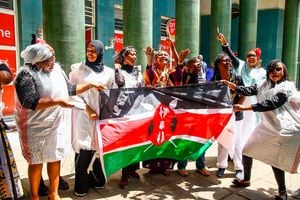
Rights activists during an anti-abductions protest on Aga Khan Walk in Nairobi on December 30, 2024.
The phrase “Life, Liberty and the pursuit of Happiness” originates from the United States Declaration of Independence, asserting unalienable rights granted by the Creator which governments are meant to protect. “Happiness” is seen not merely as pleasure but as a deeper state of well-being, aligning with moral and intellectual pursuits essential for a fulfilling life.
I’ve been thinking about how “life”, “liberty”, and the “pursuit of happiness” are essential for ensuring individual rights and freedoms. They establish a framework where citizens can thrive, participate in governance, and hold their government accountable. This concept emphasizes that governments exist to protect these rights, promoting equality and justice while preventing tyranny. A civil society flourishes when individuals recognise their rights and responsibilities.
At the heart of it, these are also the fundamental rights that Gen Z is seeking today. Indeed they are the very individuals to seek fulfillment and personal growth, fostering a society where everyone has the opportunity to thrive and contribute meaningfully to their communities. Because in all the anxiety we are feeling these days about the state of our nation, it is our lives, liberties and happiness that feel threatened the most.
I have recently been reflecting on what it means to have inclusive economic growth, especially in the African continent’s context and in this day and age. Oxfam reports that all levels of poverty are on the rise in Africa, despite some regions experiencing economic growth.
Poverty and food insecurity
Factors contributing to this trend include extreme inequality, where a small number of individuals hold vast wealth compared to the majority living in poverty. The Covid-19 pandemic exacerbated these issues, pushing millions into deeper poverty and food insecurity. Without significant changes in government policies and investments in public services, the gap between the rich and poor will continue to widen, hindering efforts to eradicate poverty across the continent.
As we deconstruct this reality the truth be told, the economy is not just about the numbers. If it were, then the Kenya National Bureau of Statistics (KNBS) data reporting a 4.9 per cent and 5.6 per cent GDP expansion in 2022 and 2023 respectively should also reflect in all our pockets.
The truth, however, is stark - the margin between those barely surviving, those coping, those keeping their heads above water, on the one hand, and the wealthiest among us is startling. The fact is, the models are skewed towards short term year on year growth at the cost and detriment of social and ecological systems that should be factored as part of a nation’s “health”.
In spite of our GDP growth, Kenya is unable to sustain and provide basic human rights - education, health, housing, safe drinking water and services such as public transport and security.
Upon closer examination of economic data, it’s intriguing to note that in some African nations experiencing growth, consumption levels remain flat. While I’m not an economist, I recognize that when economic benefits are more equitably distributed, consumption levels should reflect this broader prosperity. So who exactly is “winning” in this economic boom? Why is there no “trickle down” ? Why are entrepreneurs, like Cecilia, saying that the “situation is bad” for them and their businesses and yet the economy is growing?
Tackle poverty and inequality
Is it possible that we have a situation where business interests and government have become so closely intertwined, leading to regulatory agencies acting in favor of the industries they are supposed to oversee rather than serving the public interest?
This could only serve to exacerbate economic inequality and hinder fair competition, as regulatory and economic capture allows industries to prioritize their profits over public welfare, creating barriers for new entrants and perpetuating monopolistic practices.
What does this mean for green industrialization and entrepreneurs like Cecilia? It signifies a transformative opportunity where the rule of law protects innovative ventures, allowing them to thrive without political frustration and hindrance.
As green industrialization emerges, it holds immense potential to tackle poverty and inequality by creating accessible economic models. This opportunity invites us to rethink policies, integrating sustainability with economic growth, climate resilience, and justice. We must forge a future where entrepreneurship flourishes, communities prosper, and the environment is safeguarded.
In this new landscape, we have the opportunity to challenge existing systems that often leave entrepreneurs at the mercy of political connections. Instead, we can cultivate an environment where creativity and hard work are rewarded, fostering a culture of independence, empowerment and fair access to opportunities.
Wanjira Mathai is the MD for Africa & Global Partnerships at the World Resources Institute and Chair of the Wangari Maathai Foundation










